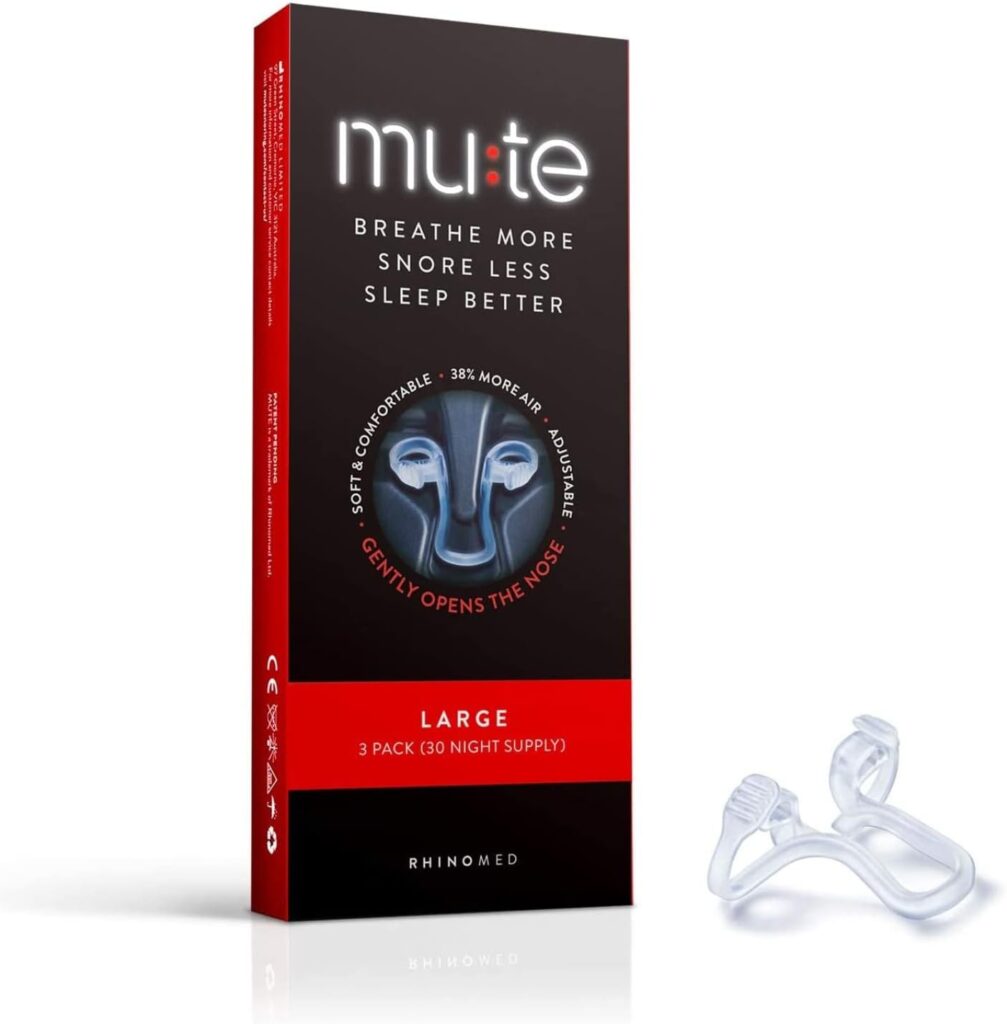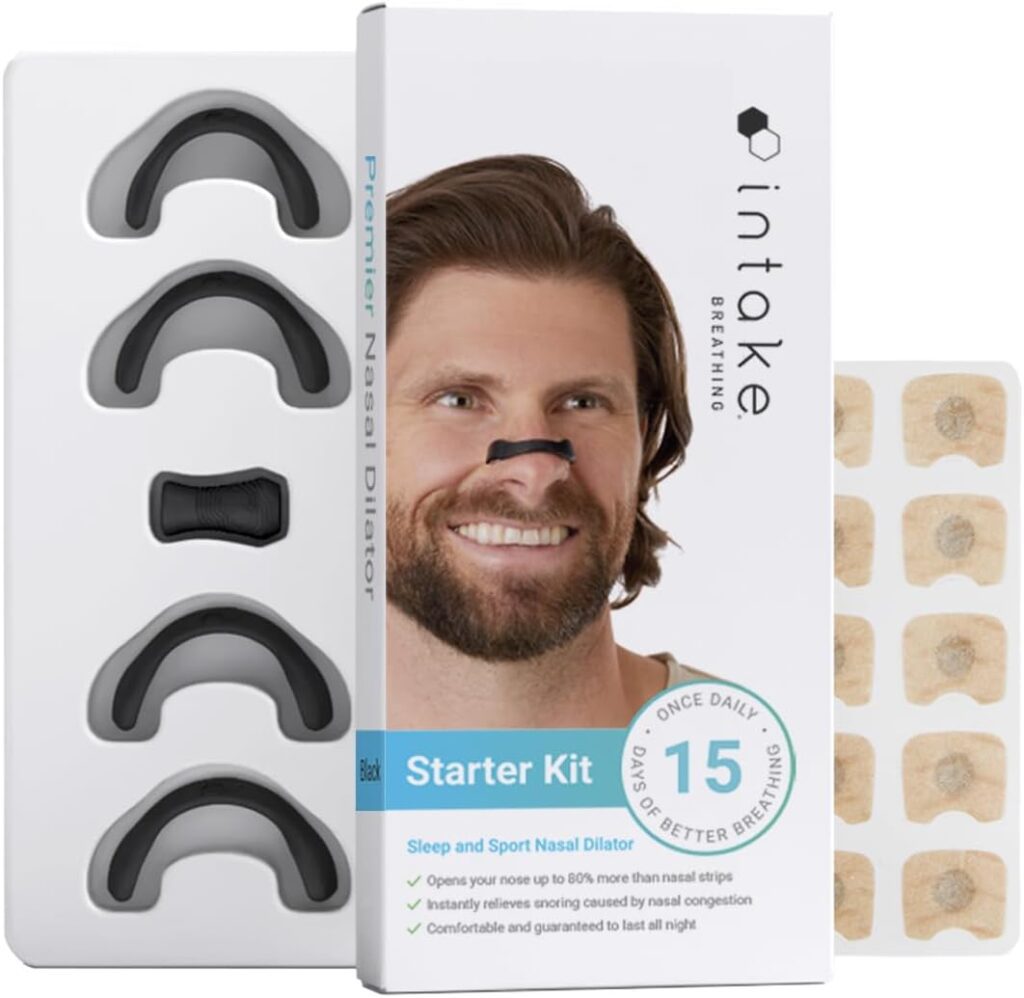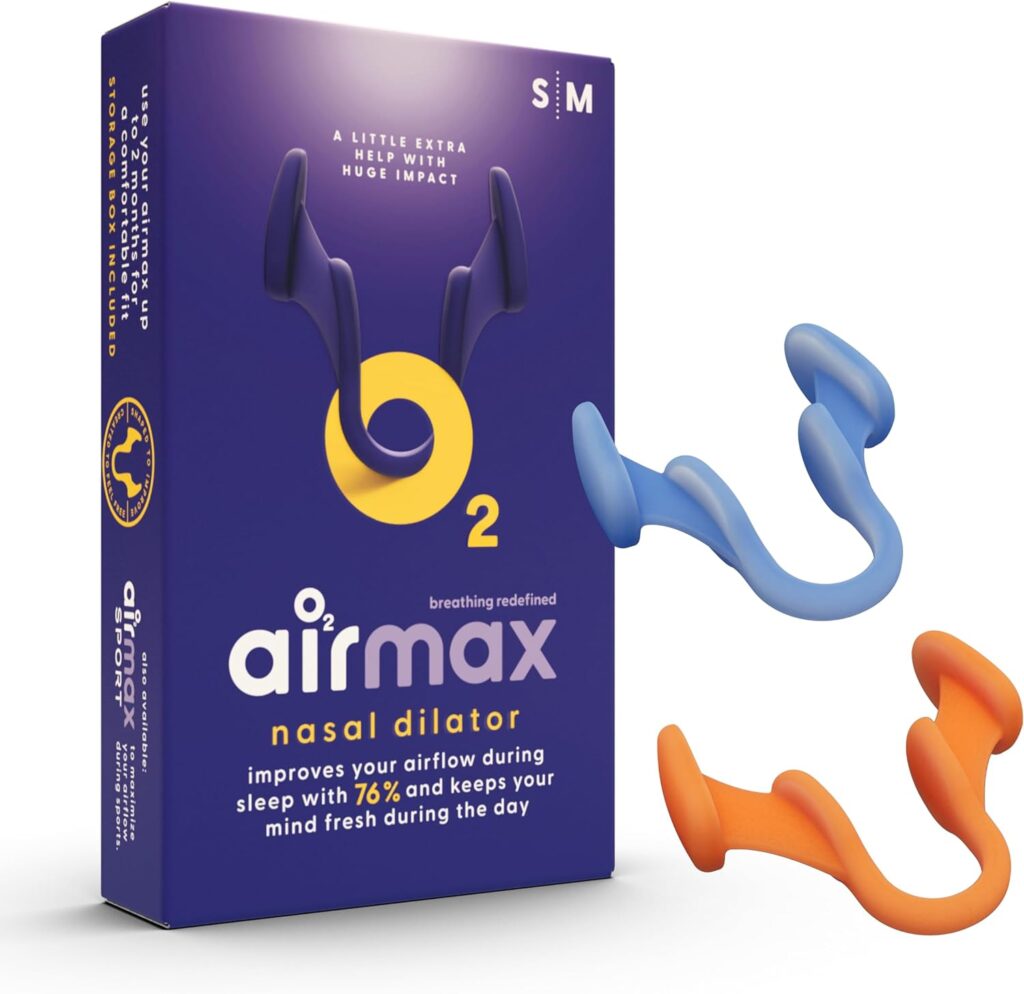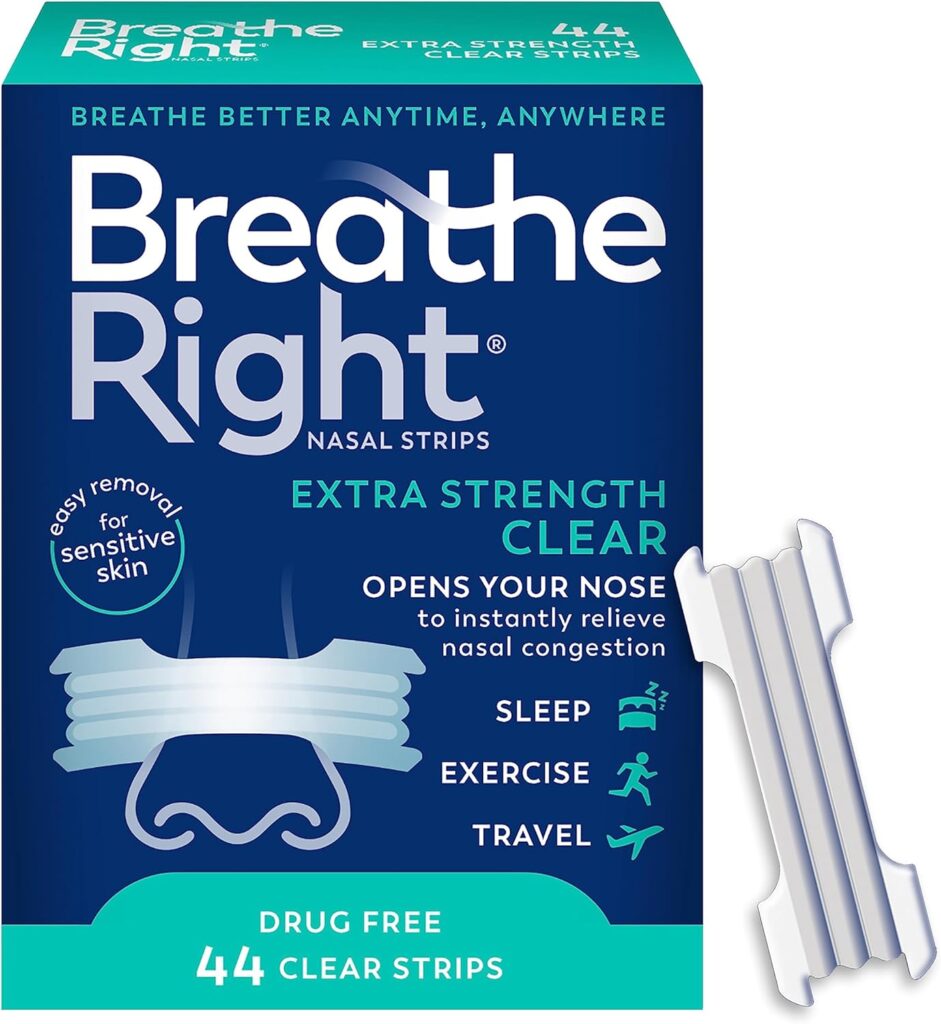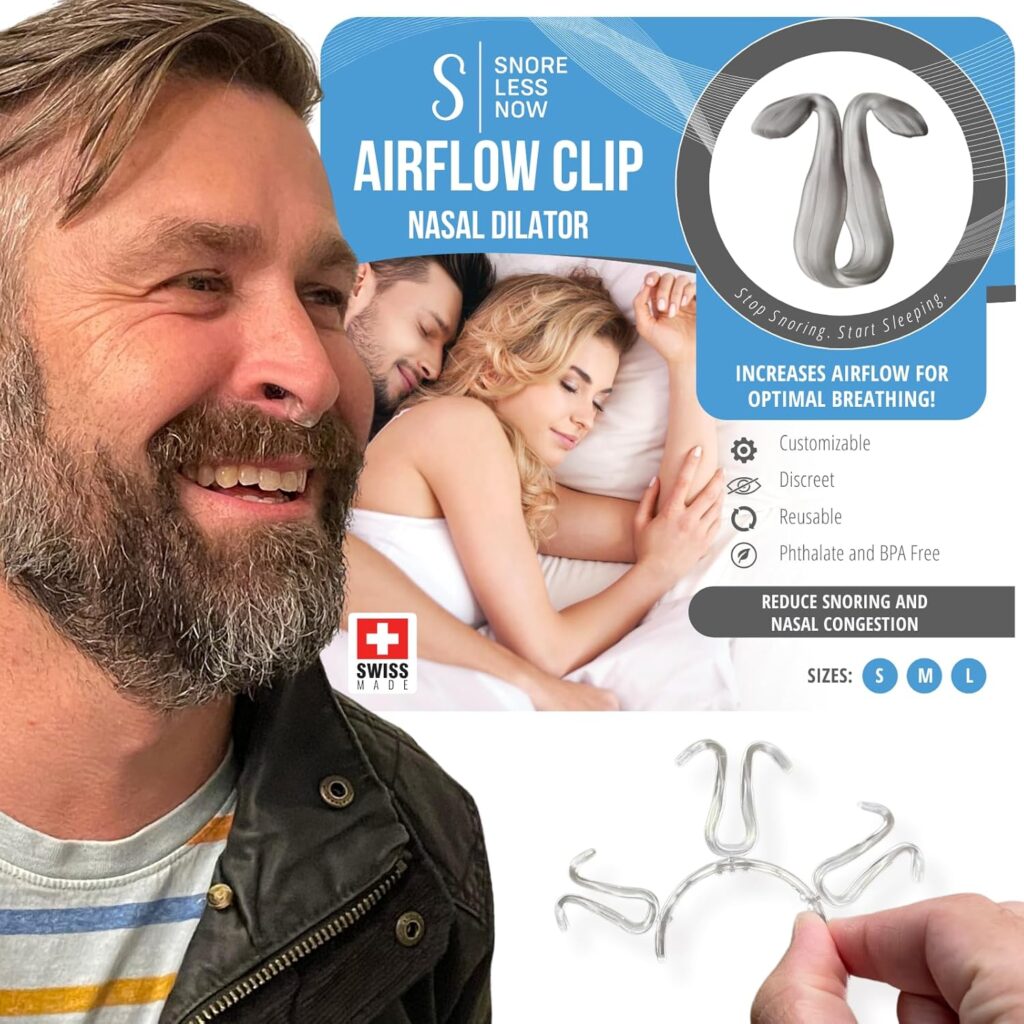5 Best Nasal Dilators for Snoring – Try These Tonight
If you’re tired of waking up to complaints about your snoring or feeling groggy from restless nights, then nasal dilators could be for you. These clever little devices open your airways, cut down on snoring, and help you (and your partner) sleep soundly. With so many options out there, we’ve narrowed it down to the best nasal dilators for snoring based on real testing and user feedback.
Whether you’re refreshing your current picks or exploring new ones, we’ve got you covered. Let’s dive into the top choices that’ll hush your nights for good.
Quickly Compare the Top Picks – Jump to Our Comparison Chart
This article features affiliate links. We may earn a small commission from qualifying purchases.
Why Nasal Dilators Work for Snoring
Snoring happens when air struggles through narrow nasal passages, vibrating tissues in your throat. Nasal dilators tackle this head-on by widening your nostrils, reducing resistance, and letting you breathe easy.
Clinical studies show that when your nasal passages are properly dilated, airflow can increase by up to 18% on average, directly addressing one of the primary causes of snoring.
Not sure if nasal dilators are right for you? Check out our guide of natural remedies to stop snoring to explore alternatives.
Top 5 Nasal Dilators for Snoring in 2025
Properly fitted nasal dilators can significantly reduce snoring intensity and improve oxygen saturation during sleep. Research indicates they’re particularly effective for people with nasal valve collapse or congestion-related snoring.
Below, we’ve analyzed countless user experiences, and compared technical specifications to bring you detailed insights on the five best nasal dilators worth your consideration.
Top 5 Nasal Dilators for Snoring
1. Best Overall – Mute Nasal Dilator
For those seeking relief from snoring, the Mute Nasal Dilator offers an effective and comfortable solution. This device features a soft, adjustable design that gently widens nasal passages to improve airflow. Crafted from medical-grade materials, it’s reusable and engineered for consistent performance. Its ultra-discrete design makes it nearly invisible while being comfortable enough for all-night wear.
Why It Stands Out: Flexible stents, FDA-registered construction, and proven airflow enhancement.
Effectiveness: Increases nasal airflow, ideal for mild to moderate snoring caused by nasal restriction.
How to Use It: Insert prior to sleep; each unit is reusable for up to 10 nights.
Fit Tip: Begin with the starter pack (small, medium, large) to determine the optimal size for your nasal passages.
Where to Get It: Mute Nasal Dilator on Amazon
Widely regarded for its reliability, this dilator remains a trusted option among users seeking a straightforward snoring remedy.
2. Best Nasal Dilator for Heavy Duty Relief: Intake Breathing Nasal Strip Starter Kit
For individuals with persistent or severe snoring, the Intake Breathing Nasal Strip Starter Kit provides a powerful solution. Intake’s design pulls from the band, not the skin from the bridge of your nose, and won’t damage the delicate skin and blood vessels inside your nose. This system uses adhesive tabs and a reusable magnetic band to optimize airway openness effectively.
Why It Stands Out: Patented magnetic technology, reusable band, and high-performance design.
Effectiveness: Maximizes airflow—perfect for congestion or deviated septums.
How to Use It: Attach the single-use tabs and secure with the reusable band; use the applicator for precision.
Fit Tip: Follow the included guide for tab placement to ensure optimal magnetic alignment.
Where to Get It: Intake Breathing on Amazon
Flying off Amazon shelves—users rave about its staying power and snore-crushing results.
3. Best Nasal Dilator for Sensitive Noses: AirMax Nasal Dilator
For those with sensitive nasal passages or allergies, the AirMax Nasal Dilator offers a gentle yet effective option. Constructed from hypoallergenic materials, this reusable device widens airways without adhesives or irritation. Its lightweight design ensures comfort over extended use.
Why It Stands Out: Hypoallergenic composition, reusable for up to 90 days, and clinically validated performance.
Effectiveness: Improves airflow noticeably, making it a strong choice for nasal-based snoring.
How to Use It: Insert before sleep; clean weekly with mild soap to maintain hygiene.
Fit Tip: Opt for the small size if your nasal passages are narrow for a secure, comfortable fit.
Where to Get It: AirMax Nasal Dilator on Amazon
Highly valued for its skin-friendly design, this dilator maintains popularity among users with sensitivity concerns.
4. Best Budget Nasal Dilator: Breathe Right Original Nasal Strips
For an affordable yet effective snoring solution, Breathe Right Extra Strength Strips deliver consistent results. These adhesive nasal strips lift and open nasal passages to facilitate better breathing. Made with a strong, skin-friendly adhesive, they are designed for single-use convenience and broad accessibility.
Why It Stands Out: Clinically proven design, reliable 3M adhesive, and no internal components required.
Effectiveness: Reduces snoring associated with mild nasal congestion, backed by years of research.
How to Use It: Apply to clean, dry skin before bed; discard after one night. Suitable to use alongside CPAPs.
Fit Tip: Ensure firm application to maximize airflow—partial adhesion may reduce performance.
Where to Get It: Breathe Right Original Nasal Strips on Amazon
A long-standing leader in nasal strips, this product is favored for its cost-effectiveness and proven efficacy.
5. Best Nasal Dilator for Flexibility: SnoreLessNow Airflow Clip Nasal Dilator
For users needing a customizable snoring solution, the SnoreLessNow Airflow Clip Nasal Dilator provides adaptable relief. Available in small, medium, large sizes as well as a starter pack with all 3, this swiss-made anti-snoring clip allows for personalized fitting. Its durable construction supports consistent use over time.
Why It Stands Out: Adjustable sizing, PA-free, Phthalate-free, and latex-free. Reliable airflow improvement while sleeping to significantly reduce snoring and excellent nasal breathing aid for deviated septums.
Effectiveness: Increases airflow by 40%, effective for a range of snoring intensities.
How to Use It: Test both sizes to find your fit; wear nightly and rinse after use.
Fit Tip: Select the medium size as a starting point unless your nasal passages are notably small.
Where to Get It: SnoreLessNow Airflow Clip on Amazon
Recognized for its versatility, this dilator appeals to users seeking tailored snoring reduction..
How to Choose the Right Nasal Dilator for Snoring
When choosing the right nasal dilator (also known as nostril enlargers or airflow enhancers), consider factors such as comfort, effectiveness, reusability, and your specific nasal anatomy:
Types of Nasal Dilators: External vs. Internal
External Nasal Dilators
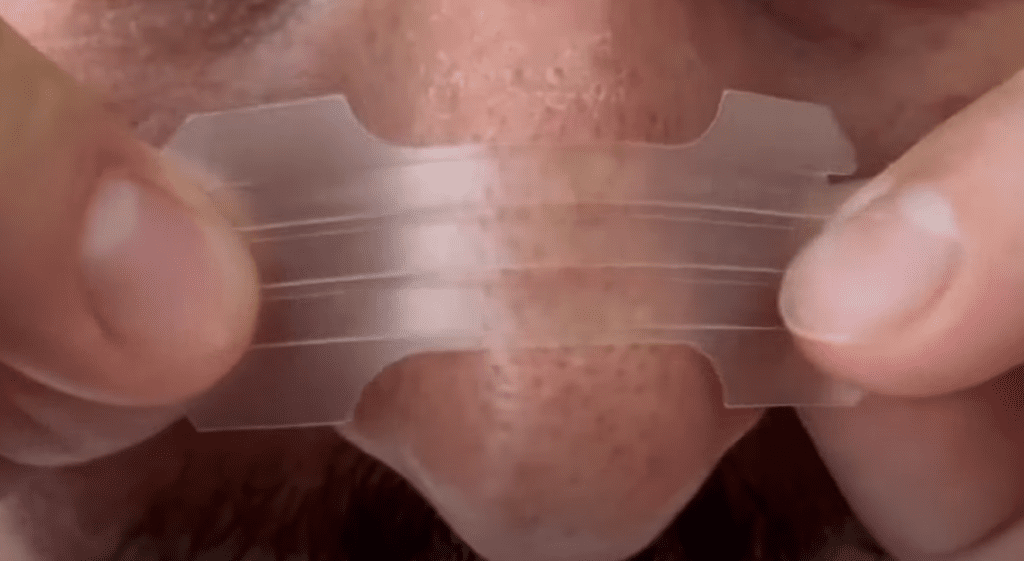
- Work like a “bridge lift” for your nose
- Use adhesive strips with flexible bands
- Sit on the outside of your nose
- Best for: sensitive nostrils, CPAP users, temporary use
Internal Nasal Dilators
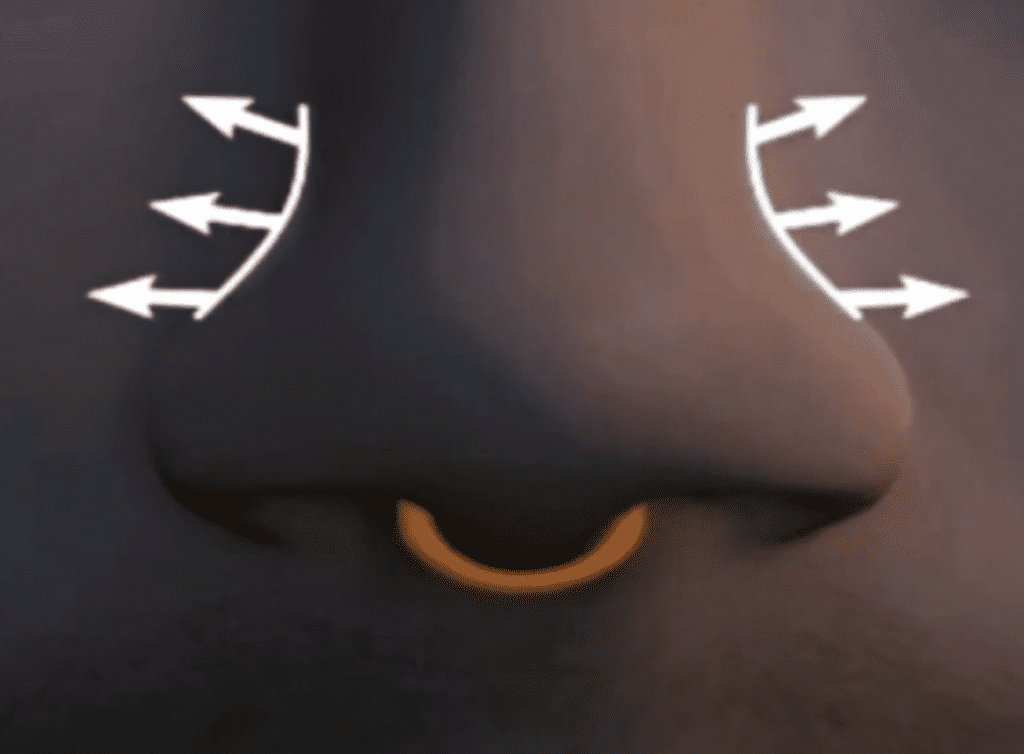
- Insert inside the nostrils
- Made from soft, medical-grade materials
- Available in various sizes and shapes
- Best for: long-term use, active sleepers, consistent results
6 Essential Factors to Consider When Choosing Your Nasal Dilator
- Material: Look for hypoallergenic materials if you have sensitive skin. Most quality nasal dilators are made from medical-grade materials like silicone to minimize the risk of irritation.
- Size: Many internal dilators come in many sizes – make sure to choose one that fits comfortably. Some brands offer variety packs or adjustable options to help you find the right fit.
- Reusability: Consider whether you prefer disposable options or reusable devices. Reusable dilators can be more cost-effective in the long run but need regular cleaning.
- Price: Factor in both the upfront cost and long-term value, especially for reusable options. While some high-end dilators may seem expensive initially, they could save you money over time if they’re durable and effective.
- Comfort: Look for designs that prioritize comfort, especially if you plan to wear the dilator all night. Soft, flexible materials and ergonomic designs can make a big difference in your sleep quality.
- Effectiveness: Read reviews and consider trying different options to find the most effective solution for your specific snoring issue.
Nasal Dilators to Stop Snoring: Product Comparison Chart
Top Nasal Dilators Compared
| Product | Price | Reusability | Airflow Boost | Best For | Buy Now |
|---|---|---|---|---|---|
| Mute Nasal Dilator | $ | 10 Nights | 38% | Easy Breathing | Buy on Amazon |
| Breathe Right Strips | $ | Single Use | Proven | Tight Budgets | Buy on Amazon |
| Intake Breathing Kit | $$$ | Band Reusable | High | Heavy Duty Relief | Buy on Amazon |
| AirMax Nasal Dilator | $ | 90 Days | 76% | Sensitive Noses | Buy on Amazon |
| SnoreLessNow Clip | $$ | 30 Days | 40% | Flexibility | Buy on Amazon |
The Science Behind Nasal Dilators
Nasal dilators work by physically opening the nasal passages, which can become constricted because of various factors such as allergies, colds, or anatomical issues like a deviated septum.
By widening these passages, they increase airflow and reduce the resistance to breathing through the nose.
How External Dilators Work
External nasal dilators (or ENDs), like Breathe Right strips, work by using the elastic recoil of the nasal cartilages. When applied to the outside of the nose, these strips create a gentle outward pull on the sides of the nose.
This action lifts the nasal passages and holds them open, effectively increasing the cross-sectional area of the nasal airway.
A study published in the International Journal of General Medicine found significant symptom reduction in individuals with obstructive sleep apnea or snoring with the use of ENDs. The researchers noted that these devices were particularly effective for people with nasal valve collapse, a condition where the sides of the nose tend to collapse inward during inhalation.
How Internal Dilators Work
Internal nasal dilators work by directly expanding the nasal passages from within.
When inserted into the nostrils, these devices gently push outward, holding the nasal passages open. This action can be particularly useful for people with narrow nasal passages or those who experience nasal congestion at night.
A review published in the National Library of Medicine found that internal nasal dilators can significantly improve nasal airflow and reduce snoring in many users.
The study also noted that these devices might be more effective than external strips for some individuals, particularly those with specific nasal anatomy issues.
Comparing Nasal Dilators to Other Snoring Solutions
While nasal dilators can be highly effective for many snorers, it’s important to understand how they compare to other common snoring remedies:
Nasal Dilators vs. CPAP Machines
Continuous Positive Airway Pressure (CPAP) machines are often prescribed for sleep apnea, a serious condition where breathing repeatedly stops and starts during sleep.
While CPAP machines are more powerful and can address more severe breathing issues, they are also more invasive and expensive than nasal dilators. For a detailed comparison of treatment options, see our guide on sleep apnea mouth guards vs CPAP therapy.
Nasal dilators are a simpler, more affordable option for people who have mild to moderate snoring not caused by sleep apnea. They’re also more portable and don’t need electricity, making them ideal for travel.
Nasal Dilators vs. Mouthpieces
Anti-snoring mouthpieces, such as Mandibular Advancement Devices (MADs) or Tongue Stabilizing Devices (TSDs), work by repositioning the jaw or tongue to keep the airway open. These can be effective for snoring caused by throat obstructions but may not help with nasal-related snoring.
Nasal dilators specifically target nasal airflow and can be more comfortable for some users, especially those who find mouthpieces uncomfortable or who primarily breathe through their nose while sleeping.
Nasal Dilators vs. Lifestyle Changes
Lifestyle changes like losing weight, avoiding alcohol before bed, or sleeping on your side can all help reduce snoring. While these changes are important and should be pursued, they may not provide immediate relief.
Nasal dilators can offer a more immediate solution while you work on long-term lifestyle adjustments.
Nasal Dilators and Sleep Quality
Improving nasal breathing doesn’t just reduce snoring – it can have a significant impact on overall sleep quality. Here’s how:
Deeper Sleep
By reducing the effort required to breathe, nasal dilators can help you achieve and maintain deeper stages of sleep. This can lead to feeling more refreshed and energized upon waking.
Fewer Awakenings
Snoring and breathing difficulties can cause micro-awakenings throughout the night, even if you don’t remember them. By improving airflow, nasal dilators can reduce these disturbances, leading to more continuous, restful sleep.
Better Sleep Posture
Some people who struggle with nasal breathing end up sleeping with their mouths open, which can lead to dry mouth, sore throat, and potentially more snoring. Nasal dilators can help promote nasal breathing, allowing for more comfortable sleep postures.
Improved Sleep for Partners
Snoring doesn’t just affect the snorer – it can significantly impact a sleep partner’s rest as well. By reducing snoring, nasal dilators can improve sleep quality for both individuals, potentially leading to better relationship satisfaction and overall well-being.
Combining Nasal Dilators with Other Snoring Remedies
While nasal dilators can be effective on their own, combining them with other snoring remedies can lead to even better results. Here are some complementary approaches:
Positional Therapy
Sleeping on your back can exacerbate snoring. Using a positional therapy device or pillow in conjunction with a nasal dilator can help keep you sleeping on your side, further reducing snoring.
Humidifiers
Dry air can irritate nasal passages and increase congestion. Using a humidifier in your bedroom can help keep your nasal passages moist and clear, enhancing the effectiveness of nasal dilators.
Nasal Rinses
Using a saline nasal rinse before bed can help clear out allergens and irritants from your nasal passages. This can make nasal dilators more effective by ensuring your nasal passages are clear before you use the dilator.
Essential Oils
Some essential oils, like peppermint or eucalyptus, have natural decongestant properties. Using these in a diffuser or as part of a pre-bed routine may enhance the effectiveness of nasal dilators.
Nasal Dilators for Different Nose Shapes
Not all noses are created equal, and the effectiveness of nasal dilators can vary depending on your specific nasal anatomy. Here’s a guide to choosing the right dilator based on your nose shape:
Narrow Nostrils
If you have narrow nostrils, internal dilators like the Mute might be most effective. Look for options that come in many sizes to confirm a comfortable fit.
Wide Nostrils
For those with wider nostrils, external strips like Breathe Right might provide enough dilation. If you prefer internal dilators, look for options with a wider base.
Deviated Septum
If you have a deviated septum, you might benefit from an asymmetrical internal dilator, which allows for different levels of dilation in each nostril.
Sensitive Skin
If you have sensitive skin, you might want to opt for internal dilators to avoid potential irritation from adhesive strips. Alternatively, look for hypoallergenic external strips designed for sensitive skin.
Maintaining and Cleaning Your Nasal Dilators
Proper maintenance of your nasal dilators is crucial for both effectiveness and hygiene. Here are some tips:
External Strips
- Dispose of after each use
- Store in a cool, dry place to preserve adhesive quality
- If you experience skin irritation, try cleaning the area with alcohol before application
Internal Dilators
- Clean after each use with mild soap and warm water
- Allow to air dry completely before next use
- Replace according to manufacturer’s instructions (usually every 1-3 months)
- Consider using a UV sanitizer for extra cleanliness
When to Consult a Doctor
While nasal dilators can be effective for many snorers, there are times when it’s important to seek medical advice:
- If snoring is accompanied by gasping or choking sounds
- If you experience excessive daytime sleepiness
- If nasal dilators don’t seem to help after consistent use
- If you have persistent nasal congestion or breathing difficulties
These symptoms could show sleep apnea or other underlying health issues that need medical attention.
The Future of Nasal Dilators
As sleep science advances, so does the technology behind nasal dilators. Some exciting developments on the horizon include:
- Smart nasal dilators that can track your breathing patterns and adjust dilation accordingly
- Custom-fit dilators created using 3D printing technology
- Combination devices that incorporate both nasal dilation and aromatherapy for enhanced sleep quality
While these innovations are still in development, they point to a future where nasal dilators could play an even more significant role in improving sleep quality and overall health.
People Also Asked
Which nasal dilator is best for snoring?
The Mute Nasal Dilator is best for snoring, offering a 38% airflow boost and adjustable comfort. It’s reusable and effective for mild to moderate cases.
Do nasal dilators work for snoring?
Yes, nasal dilators have been proven effective for snoring caused by nasal congestion or anatomical issues. Clinical studies show they can increase airflow by up to 18% and significantly reduce snoring intensity, particularly in cases of nasal-related snoring.
What is the best nasal dilator for deviated septum?
The Intake Breathing Nasal Strip Starter Kit excels for deviated septums, using a magnetic band to maximize airflow. Its durable design suits structural issues.
However, the effectiveness may vary depending on the severity of the deviation. In some cases, surgical correction of the deviated septum may be necessary for significant improvement.
What is the most effective anti-snoring device?
CPAP machines are the most effective anti-snoring devices, especially for those diagnosed with sleep apnea. For mild to moderate snoring without sleep apnea, internal nasal dilators have shown significant effectiveness in clinical studies and may offer better results than external strips.
What is the best nose strip for snoring?
Breathe Right Original Nasal Strips remain the most reliable and widely recommended external nasal dilator for snoring. Their spring-like action effectively opens nasal passages without internal insertion, and they’re particularly suitable for CPAP users or those with sensitive nostrils.
How to use nasal strips for snoring?
Clean and dry your nose thoroughly, then position the strip across the bridge of your nose just above the flare of your nostrils. Press down firmly along the entire strip to secure the adhesive, ensuring the ends are fully sealed to maintain effectiveness throughout the night.
Are nasal dilators safe to use every night?
Most nasal dilators are safe for nightly use. However, it’s important to follow the manufacturer’s instructions and to stop use if you experience any discomfort or irritation.
If you have any concerns, talk to a healthcare professional.
Can nasal dilators help with sleep apnea?
While nasal dilators can help with snoring, they are not typically recommended as a primary treatment for sleep apnea. Sleep apnea is a serious condition that usually needs more comprehensive treatment, such as CPAP therapy.
Always talk to a doctor for proper diagnosis and treatment of sleep apnea.
How long do nasal dilators last?
The lifespan of nasal dilators varies depending on the type. External nasal strips are typically single-use and should be disposed of after one night.
Internal nasal dilators can last anywhere from a few days to several months, depending on the brand and how well they’re maintained.
Do nasal dilators work for everyone?
Nasal dilators can be effective for many people, but they may not work for everyone. Their effectiveness depends on the cause of your snoring.
They tend to be most effective for snoring caused by nasal congestion or structural issues in the nose.
Can nasal dilators help with allergies?
While nasal dilators aren’t designed to treat allergies directly, they can help reduce some allergy symptoms by improving nasal airflow. This can be particularly helpful at night when allergy symptoms often worsen.
Are there any side effects of using nasal dilators?
Most people experience no significant side effects from using nasal dilators. However, some may experience mild irritation or discomfort, especially when first starting to use them.
If you experience persistent discomfort or irritation, stop use and talk to a healthcare professional.
How do I know which size nasal dilator to choose?
Many brands offer sizing guides or variety packs to help you find the right fit. Generally, you want a size that feels comfortable and stays in place without causing any pain or excessive pressure.
If you’re unsure, start with a medium size or starter pack and adjust as needed.
Key Takeaways
- Nasal dilators can be an effective, non-invasive solution for snoring caused by nasal congestion or obstruction.
- There are two main types of nasal dilators: external strips and internal devices, each with their own pros and cons.
- When choosing a nasal dilator, consider factors such as comfort, effectiveness, reusability, and your specific nasal anatomy.
- Proper use and maintenance of nasal dilators is crucial for optimal effectiveness and hygiene.
- While nasal dilators can significantly improve sleep quality for many people, they may not be suitable for everyone, especially those with sleep apnea or other serious sleep disorders.
Health Disclaimer: Nasal dilators can help improve airflow and reduce snoring for some individuals. However, results may vary, and they are not a substitute for medical treatment. If you experience persistent snoring or suspect you have sleep apnea, please consult a healthcare professional.

